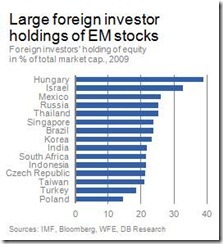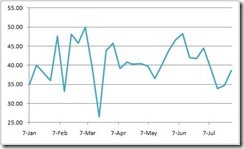In my earlier post, I pointed out that the wealthy Brazilians, Indians and Chinese had been lending “support” to the US property sector.
Under the major emerging markets the rubric of the BRIC acronym coined by Goldman Sach’s analyst Jim O’Neil, Russia posed as the missing link.
Not anymore.
From Bloomberg, (bold emphasis mine)
Roustam Tariko, billionaire owner of Russian Standard Bank and Russian Standard Vodka, completed the most expensive home purchase in Miami Beach since 2006 when he bought a $25.5 million estate on Star Island in April.
The transaction made Tariko the neighbor of another wealthy Russian with a taste for Florida luxury living. Vladislav Doronin, chairman of Moscow-based real estate developer Capital Group, paid $16 million in 2009 for the Star Island home previously owned by Shaquille O’Neal, the now-retired professional basketball player.
“In Russia, it’s a status thing now,” Jorge Uribe, a real estate agent with One Sotheby’s International Realty Inc. in Coral Gables, Florida, said in a telephone interview. “If you’re wealthy and you say you have a place in Miami, it’s like saying back in the old days, ‘I own a place in Ibiza or Monaco.’ It’s a cocktail conversation thing.”
International investors are buying some of the priciest homes in America as the broader housing market slumps and a weak dollar makes U.S. property more of a bargain. Sales of residences above $20 million are rising in New York, California and Florida, which are popular business and vacation destinations for foreigners, according to Miller Samuel Inc., DataQuick and real estate brokers who cater to luxury buyers.
This is just one of the manifestations of the effects of globalization from fund flows (capital mobility) to the diffusion of prosperity worldwide.
The same article underscores this, (bold emphasis mine)
The precise number of foreign deals for U.S. luxury properties is difficult to calculate because many purchasers are registered as trusts or limited liability companies. Jed Smith, managing director of quantitative research for the National Association of Realtors, said the number of overseas buyers for multimillion-dollar homes is increasing, helped by the rise of emerging markets such as Russia, Brazil, China and India.
“There’s substantial growing wealth overseas,” Smith said in a telephone interview from Washington. “Just go to the Forbes list of billionaires and see that we’re no longer the only folks on it.”
Of the 214 newcomers to Forbes magazine’s annual global ranking of billionaires this year, 54 were from China and 31 from Russia. The Asia-Pacific region had more billionaires than Europe for the first time in more than 10 years and gained the most of any region, with 105 additions, according to the list. Moscow displaced New York as the city with the greatest number of billionaires with 79, compared with New York’s 58.
If there is anything that would be considered as certain or permanent, (aside from death and taxes) that would be ‘change’.


